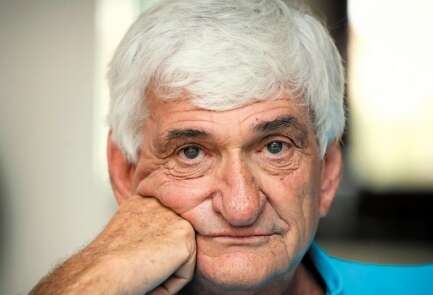Legendary IDF general Avigdor "Yanush" Ben-Gal, credited with fending off the Syrian advance on the Golan Heights in the 1973 Yom Kippur War, died of a serious illness Saturday at the age of 79. Ben-Gal was born in 1936 in Lodz, Poland. He and his family fled to the Soviet Union when World War II broke out, but his parents disappeared during the journey. Ben-Gal and his sister, Ilana, managed to get to Israel via Iran, arriving with the "Tehran Children" transport mission. Ben-Gal would later learn that his father had survived the Holocaust and the two were reunited. Ben-Gal grew up with an adoptive family at Kibbutz Givat Brenner, afterward moving to Tel Aviv. He enlisted in the IDF just before the 1956 Sinai Campaign. Ben-Gal was drafted to the Armored Corps, where he would later climb the ranks. He was promoted to commander of the 7th Brigade, which he led in the Golan Heights during the 1973 Yom Kippur War. The brigade managed to hold off the Syrian tank divisions until reinforcements could arrive, despite being vastly outnumbered. The feat earned Ben-Gal recognition as a war hero. The 7th Brigade was urgently summoned to the northern front on Friday evening, the night before Yom Kippur and the start of the war. They landed at the Mahanayim Airport in Rosh Pina in six Dakota airplanes. "The Brigade was stationed in the northern Golan Heights, facing waves of Syrian divisions that repeatedly tried to break through," wrote Ilan Sahar, the 7th Brigade intelligence officer at the time, in his book. "On Tuesday, Oct. 9, after four days without back-up, at its breaking point and against all odds, the brigade managed to stop the final Syrian attempt to break through, preventing the capture of the northern Heights." 'Victory of victories' In an interview with Israel Hayom's weekend edition about three years ago, Ben-Gal recalled that day, saying that the noon hour will forever be engraved in his memory. "I remember the exact time because I was dealing with a difficult feeling," he said. "I felt that I had lost control. "I felt that I, Yanush, commander of the great 7th Brigade, was about to shame that very brigade. We had been through four days of harsh battle, we lost many fighters and dozens of tanks. We had only 17 to 20 tanks left against the Syrian forces that were coming toward us. I was afraid they would reach the Quneitra-Mas'ade Road. "The tsunami was so huge, no dam could have held it back. Our ammunition had run out, we were out of gas, we were growing more tired and everything was a mess. Division commanders had been killed, and company commanders had been killed and injured, and one battalion commander had been killed. ... I was close to sending out withdrawal orders over the communication system. I called Raful [then-Brigade Commander Rafael Eitan] and told him that we couldn't last any longer. Raful told me, 'Hold on just a little longer, just a few more minutes. [Seventh Brigade Operations Officer] Yossi Ben-Hanan is on his way to you with tanks and more troops." One of the most difficult battles faced by the 7th Brigade was at the Valley of Tears, under the command of Lt. Col. Avigdor Kahalani. About two days after the battle, the brigade's soldiers went deep into Syria, spearheading the northern command's conquest of the Syrian enclave. "We prevented the occupation of the Golan," Ben-Gal said. "After the containment battles, Chief of Staff Dado [David Elazar], Northern Command head [Yitzhak] Hofi and Defense Minister [Moshe] Dayan told me, 'You saved the State of Israel.'" During the interview, Ben-Gal also expressed anger over the fact that Israelis do not consider the Yom Kippur War to have been a victory. "It was a huge victory, a great accomplishment -- it was the biggest victory Israel has had until now, even more so than the War of Independence," he said. "This is the victory of all victories. To end a war that began in the way this one did by crossing the Suez Canal, defeating two huge armies, with our forces reaching deep into Egypt and deep into Syria, posing a threat to Damascus -- that is a huge accomplishment." Failure in Sultan Yacoub After the war, Ben-Gal was made commander of the 36th Armored Division, then assistant chief of operations, GOC Northern Command during Operation Litani (the 1978 South Lebanon conflict) and corps commander during the First Lebanon War in 1982. In the First Lebanon War, he was in command during the Battle of Sultan Yacoub, in which 20 soldiers were killed and three others went missing (they are still missing today). Afterward, he was favored for but did not receive the appointment chief of staff following the war, and he subsequently left the military. He went on to fill a number of private and public roles, including chairman of Israel Aerospace Industries and director at the Tahal water infrastructure group. The IDF Spokesperson's Unit released a statement about Ben-Gal on Saturday evening, saying: "Chief of Staff Lt. Gen. Gadi Eizenkot, the IDF General Staff forum, the IDF commanders and soldiers, both in mandatory and reserve service, cherish his memory and send our condolences to the family. The IDF salutes Maj. Gen. (ret.) Avigdor (Yanush) Ben-Gal for his work, his legacy and his long-standing contribution to the security of the State of Israel." Ben-Gal's funeral will take place on Sunday at Kiryat Shaul military cemetery. He is survived by his wife, Avital, seven children, and grandchildren.
Ben-Gal served as operations officer of the 7th Armored Brigade during the 1967 Six-Day War, and he was the commander of a battalion near the Suez Canal during the subsequent War of Attrition (which ended in 1970).
